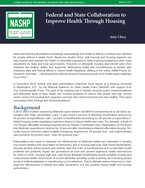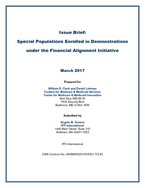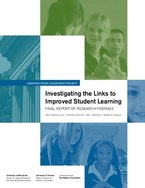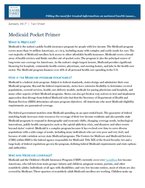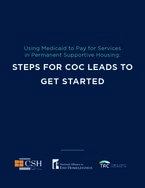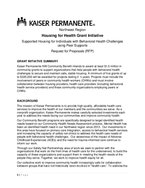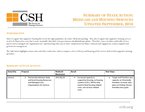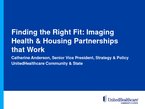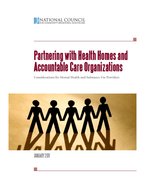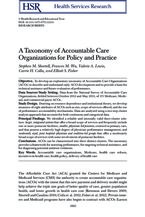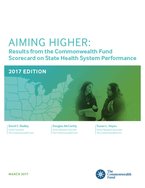0
Policy Brief
Community:
Jul 19, 2018
While links between housing deficiencies and health conditions are well substantiated, research evaluating the health benefits of specific interventions has been limited. There is, however, some evidence that multifaceted interventions may lead to improvements in health of children and families, as well as to reduced use of medical services.
Authored by:
Topics: Community development, Funding, Health, Healthy homes, Medicaid / Medicare, Seniors
 Shared by Housing Is
Shared by Housing Is
Housing Is posted a
on Jul 19, 2018
While links between housing deficiencies and health conditions are well substantiated, research evaluating the health benefits of specific interventions has been limited.
0
Report
Community:
Jul 19, 2018
In December 2016, federal and state policymakers examined health and housing issues at a meeting convened in Washington, D.C., by the National Academy for State Health Policy (NASHP) with support from The Commonwealth Fund. The goal of the meeting was to identify concrete policy recommendations and actionable steps to align health and housing programs to ensure that people with high service needs receive the housing and supportive services they need to become and stay healthy. This report summarizes their findings and recommendations
Authored by:
Topics: Data sharing, Disabilities, Health, Homelessness, Legislation & Policy, Low-income, Medicaid / Medicare, Partnerships, Supportive housing
 Shared by Housing Is
Shared by Housing Is
Housing Is posted a
on Jul 19, 2018
In December 2016, federal and state policymakers examined health and housing issues at a meeting convened in Washington, D.C., by the National Academy for State Health Policy (NASHP) with support from The Commonwealth Fund.
0
Report
Community:
Jul 18, 2018
This Issue Brief provides an update on the beneficiary experience in the first two demonstrations that were implemented as part of the Centers for Medicare & Medicaid Services (CMS) Financial Alignment Initiative to test integrated care and financing models for Medicare-Medicaid enrollees. The Washington Health Homes MFFS demonstration, a managed fee-forservice model demonstration, and the Massachusetts One Care demonstration, a capitated model demonstration, began operations on July 1st and October 1st of 2013, respectively.
For the purposes of this report, special populations encompass the following: (1) enrollees who use long-term services and supports (LTSS) which include nursing facilities, personal care services, residential care facilities, and adult day care; (2) enrollees with behavioral health needs, including those with serious and persistent mental illness (SPMI) such as schizophrenia and bipolar disorder; and (3) linguistic, ethnic, and racial minorities enrolled in the demonstrations. The purpose of this brief is to report how enrollees who use these services are faring under the Washington and Massachusetts demonstrations and to understand if disparities in services and demonstration experiences exist for these groups.
Authored by:
Topics: East Coast, Health, Healthy homes, Immigrants, Low-income, Medicaid / Medicare, Pacific Northwest, Partnerships, Racial inequalities, Research
 Shared by Housing Is
Shared by Housing Is
Housing Is posted a
on Jul 18, 2018
This Issue Brief provides an update on the beneficiary experience in the first two demonstrations that were implemented as part of the Centers for Medicare & Medicaid Services (CMS) Financial Alignment Initiative to test integrated care and financing models for Medicare-Medicaid enrollees.
0
Report
Community:
Jul 18, 2018
This Issue Brief describes the results of focus groups conducted in six States as part of the Centers for Medicare & Medicaid Services Financial Alignment Initiative to test integrated care and financing models for Medicare-Medicaid enrollees. Five of these States—California, Illinois, Massachusetts, Ohio, and Virginia—are implementing a capitated model demonstration in which Medicare-Medicaid Plans (MMPs) provide coordinated benefits and access to new and flexible services through a person-centered care model. One, Washington, is implementing a managed fee-for-service model demonstration in which health homes are responsible for organizing enhanced integration of primary, acute, behavioral, and long-term services and supports across existing delivery systems for Medicare-Medicaid enrollees and for directing person-centered care for high-cost, high-risk enrollees.
Authored by:
Topics: Cost effectiveness, Health, Healthy homes, Low-income, Medicaid / Medicare, Partnerships, Racial inequalities, Research
 Shared by Housing Is
Shared by Housing Is
Housing Is posted a
on Jul 18, 2018
This Issue Brief describes the results of focus groups conducted in six States as part of the Centers for Medicare & Medicaid Services Financial Alignment Initiative to test integrated care and financing models for Medicare-Medicaid enrollees.
0
Policy Brief
Community:
Jul 17, 2018
Medicaid is the nation’s public health insurance program for people with low income. The Medicaid program covers more than 70 million Americans, or 1 in 5, including many with complex and costly needs for care. The vast majority of Medicaid enrollees lack access to other affordable health insurance. Medicaid covers a broad array of health services and limits enrollee out-of-pocket costs. The program is also the principal source of long-term care coverage for Americans. As the nation’s single largest insurer, Medicaid provides significant financing for hospitals, community health centers, physicians, and nursing homes, and jobs in the health care sector. The Medicaid program finances over 16% of all personal health care spending in the U.S.
Authored by:
Topics: Affordable Care Act, Funding, Health, Legislation & Policy, Low-income, Medicaid / Medicare
 Shared by Housing Is
Shared by Housing Is
Housing Is posted a
on Jul 17, 2018
Medicaid is the nation’s public health insurance program for people with low income. The Medicaid program covers more than 70 million Americans, or 1 in 5, including many with complex and costly needs for care.
0
Case study
Community:
Jul 13, 2018
The Conway Center is a project of a nonprofit housing and services organization, So Others Might Eat, and a federally qualified health center, Unity Health Care, in Washington, DC. This $90 million community development initiative will colocate employment training, health care services, and affordable housing under one roof in Ward 7, an area of DC experiencing high poverty and unemployment, and poor health outcomes. The partnership aims to improve access to affordable rental housing, increase livable-wage job attainment, and connect residents to high-quality health care services. Although still under construction, this partnership highlights how a shared vision among community-serving organizations and funders can result in a comprehensive strategy for improving resident health and well-being
Authored by:
Topics: Community development, Cost effectiveness, Food insecurity, Health, Housing, Low-income, Medicaid / Medicare, Partnerships, Place-based, Stability
 Shared by Housing Is
Shared by Housing Is
Housing Is posted a
on Jul 13, 2018
The Conway Center is a project of a nonprofit housing and services organization, So Others Might Eat, and a federally qualified health center, Unity Health Care, in Washington, DC.
0
Publication
Community:
Jul 13, 2018
This guide is organized around five steps, each of which includes concrete ways to get started as well as links to additional resources. These five steps will help you build a case for why and how Medicaid can be structured at the state and local levels to pay for services in permanent supportive housing. When building a case you need to know some basics of Medicaid and the types of services you want Medicaid to cover. in order to convince Medicaid administrators and other health care payers to support your efforts, you need to have evidence of need for and impact of supportive housing and you need a coalition of many stakeholders at your side.
Authored by:
Topics: Affordable Care Act, Data sharing, Funding, Health, Homelessness, Medicaid / Medicare, Partnerships, Supportive housing
 Shared by Housing Is
Shared by Housing Is
Housing Is posted a
on Jul 13, 2018
This guide is organized around five steps, each of which includes concrete ways to get started as well as links to additional resources.
0
Publication
Community:
Jul 13, 2018
This paper offers strategic guidance in building, assessing and/or strengthening various types of partnerships between Health Center Program Grantees, behavioral health providers and supportive housing providers. Whether you represent one of these types of organizations or you are merely curious about health and housing partnerships, you can use this guide as your roadmap.
Authored by:
Topics: Data sharing, Dual-eligibles, Health, Low-income, Medicaid / Medicare, Partnerships, Supportive housing
 Shared by Housing Is
Shared by Housing Is
Housing Is posted a
on Jul 13, 2018
This paper offers strategic guidance in building, assessing and/or strengthening various types of partnerships between Health Center Program Grantees, behavioral health providers and supportive housing providers.
0
Publication
Community:
Jul 13, 2018
Recognizing the layers to developing a health and housing partnership, this Literature Review and Resource Bank is intended to provide background and data resources that can be used in grant applications or in conversations with potential funders in the effort to foster new health and supportive housing partnerships.
Authored by:
Topics: Cost effectiveness, Criminal justice, Data sharing, Dual-eligibles, Funding, Health, Homelessness, Housing, Low-income, Medicaid / Medicare, Mental health, Partnerships, Post-secondary, Preventative care, Research, Seniors, Substance abuse, Supportive housing, Youth
 Shared by Housing Is
Shared by Housing Is
Housing Is posted a
on Jul 13, 2018
Recognizing the layers to developing a health and housing partnership, this Literature Review and Resource Bank is intended to provide background and data resources that can be used in grant applications or in conversations with potential funders in the effort to foster new health and supportive hou
0
Report
Community:
Jul 13, 2018
This document highlights actions states and other entities have taken to improve service delivery and financing of the services delivered by supportive housing providers.
Authored by:
Topics: Health, Housing, Low-income, Medicaid / Medicare, Partnerships
 Shared by Housing Is
Shared by Housing Is
Housing Is posted a
on Jul 13, 2018
This document highlights actions states and other entities have taken to improve service delivery and financing of the services delivered by supportive housing providers.
0
Policy Brief
Community:
Jul 13, 2018
A Toolkit for State Agencies
Authored by:
Topics: Affordable Care Act, Health, Legislation & Policy, Low-income, Medicaid / Medicare
 Shared by Housing Is
Shared by Housing Is
Housing Is posted a
on Jul 13, 2018
A Toolkit for State Agencies
0
Publication
Community:
Jul 13, 2018
Authored by:
Topics: CLPHA, Data sharing, Health, Housing, Legislation & Policy, Low-income, Medicaid / Medicare, Partnerships, Preventative care, Research
 Shared by Housing Is
Shared by Housing Is
Housing Is posted a
on Jul 13, 2018
0
Report
Community:
Jul 12, 2018
The structure of the evaluation is designed around several research domains that, together, provide a comprehensive assessment of the Community-based Care Transitions Program. The research concentrates on the following areas:
• Program Implementation/Operational Issues.
• Beneficiary Participation.
• Provider Participation.
• Utilization and Readmissions.
• Costs/Savings.
• Quality Monitoring and Quality Improvement.
• Unintended Consequences.
Authored by:
Topics: Cost effectiveness, Data sharing, Health, Low-income, Medicaid / Medicare, Partnerships, Seniors
 Shared by Housing Is
Shared by Housing Is
Housing Is posted a
on Jul 12, 2018
The structure of the evaluation is designed around several research domains that, together, provide a comprehensive assessment of the Community-based Care Transitions Program. The research concentrates on the following areas:
• Program Implementation/Operational Issues.
0
Publication
Community:
Jul 12, 2018
This brief aims to bring attention to non-Medicaid funding sources that states could potentially blend or braid to address social determinants of health and other needs that are not typically covered by Medicaid. It is intended to familiarize state Medicaid, public health, and other state policymakers with the funding streams of other agencies, and sketch out a continuum of options to help states coordinate funding to better serve the needs of low-income populations. Because this brief focuses on services for adult Medicaid beneficiaries, it does not address many of the funding sources available for children’s services. However, existing efforts to pool funds for children and youth—notably by the Commonwealth of Virginia—could prove instructive for states seeking to launch such an effort for adults.
Authored by:
Topics: Cost effectiveness, Data sharing, Dual-eligibles, Food insecurity, Funding, Health, Homelessness, Housing, Legislation & Policy, Low-income, Medicaid / Medicare, Mental health, Partnerships, Research, Substance abuse
 Shared by Housing Is
Shared by Housing Is
Housing Is posted a
on Jul 12, 2018
This brief aims to bring attention to non-Medicaid funding sources that states could potentially blend or braid to address social determinants of health and other needs that are not typically covered by Medicaid.
0
Publication
Community:
Jul 12, 2018
This report examines four specific aspects of the challenge before us:
• The need for a much greater supply of homes affordable to our nation’s lowest-income seniors.
• The importance of transforming homes and communities so that seniors can age with options, a desire shared by the overwhelming majority of older adults.
• The imperative to better integrate health care and supportive services with housing, recognizing that this integration has the potential to improve health outcomes for seniors and reduce the costs borne by the health care system.
• The need to deploy technologies on a far wider scale to help all Americans age successfully.
Authored by:
Topics: Cost effectiveness, Funding, Health, Home visiting, Homelessness, Housing, Legislation & Policy, Low-income, Medicaid / Medicare, Partnerships, Place-based, Preventative care, Seniors, Supportive housing
 Shared by Housing Is
Shared by Housing Is
Housing Is posted a
on Jul 12, 2018
This report examines four specific aspects of the challenge before us:
• The need for a much greater supply of homes affordable to our nation’s lowest-income seniors.
• The importance of transforming homes and communities so that seniors can age with options, a desire shared by the overwhelming ma
0
Publication
Community:
Jul 12, 2018
Authored by:
Topics: Child welfare, Dental, Early childhood, Education, Exercise, Family engagement, Health, Housing, Medicaid / Medicare, Mental health, Nutrition, Partnerships, Place-based, Preventative care, Seniors, Vision
 Shared by Housing Is
Shared by Housing Is
Housing Is posted a
on Jul 12, 2018
0
Report
Community:
Jul 12, 2018
We examined the influence of maternal health literacy on child participation in social welfare programs. In this cohort, 20% of the mothers had inadequate or marginal health literacy. Initially, more than 50% of the families participated in Temporary Assistance for Needy Families (TANF), the Food Stamp Program, and Special Supplemental Nutrition Program for Women, Infants, and Children, whereas fewer than 15% received child care subsidies or public housing. In multivariate regression, TANF participation was more than twice as common among children whose mothers had adequate health literacy compared with children whose mothers had inadequate health literacy
Authored by:
Topics: Child welfare, Dual-generation, Early childhood, Education, Family engagement, Food insecurity, Health, Housing, Low-income, Medicaid / Medicare, Nutrition, Pre-natal, Preventative care, Research, Stability
 Shared by Housing Is
Shared by Housing Is
Housing Is posted a
on Jul 12, 2018
We examined the influence of maternal health literacy on child participation in social welfare programs. In this cohort, 20% of the mothers had inadequate or marginal health literacy.
0
Report
Community:
Jul 12, 2018
This article deconstructs the history, structure, and financing that have made this unique partnership between Philadelphia's Department of Behavioral Health and Intellectual Disabilities, the Office of Homeless Services, and the Housing Authority, possible.
Authored by:
Topics: Data sharing, Disabilities, Dual-eligibles, Health, Housing, Legislation & Policy, Low-income, Medicaid / Medicare, Mental health, Partnerships, Preventative care, Research, Supportive housing
 Shared by Housing Is
Shared by Housing Is
Housing Is posted a
on Jul 12, 2018
This article deconstructs the history, structure, and financing that have made this unique partnership between Philadelphia's Department of Behavioral Health and Intellectual Disabilities, the Office of Homeless Services, and the Housing Authority, possible.
0
News Article
Community:
Jul 9, 2018
Neighborhood may matter more than race in breast cancer survival rates
Authored by: Darcel Rockett for THE CHICAGO TRIBUNE
Topics: Health, Legislation & Policy, Low-income, Medicaid / Medicare, Midwest, Racial inequalities
 Shared by Abra Lyons-Warren
Shared by Abra Lyons-Warren
Abra Lyons-Warren posted a
on Jul 12, 2018
Darcel Rockett for THE CHICAGO TRIBUNE
Neighborhood may matter more than race in breast cancer survival rates
0
Report
Community:
Jul 12, 2018
Considerations for Mental Health and Substance Use Providers
Authored by:
Topics: Affordable Care Act, Health, Healthy homes, Legislation & Policy, Low-income, Medicaid / Medicare, Partnerships
 Shared by Housing Is
Shared by Housing Is
Housing Is posted a
on Jul 12, 2018
Considerations for Mental Health and Substance Use Providers
0
Research
Community:
Jul 12, 2018
To construct our taxonomy, we use data from the first National Survey of ACOs, fielded between October of 2012 and May of 2013. The survey sample included (1) ACOs participating in Medicare ACO programs; (2) ACOs participating in state Medicaid ACO programs; and (3) ACOs formed in partnership with commercial payers.
Authored by:
Topics: Affordable Care Act, Medicaid / Medicare, Metrics, Research
 Shared by Housing Is
Shared by Housing Is
Housing Is posted a
on Jul 12, 2018
To construct our taxonomy, we use data from the first National Survey of ACOs, fielded between October of 2012 and May of 2013.
0
Case study
Community:
Jul 12, 2018
In Boston, Massachusetts, the Boston Housing Authority, Boston Public Health Commission, the city’s Inspectional Services Department, the Boston Foundation, and local universities and medical institutions have come together over the last decade-plus to address the intersection of health and housing. Motivated by a desire to improve the lives of Boston’s most vulnerable residents, these organizations began collaborating to address asthma and, more recently, to prioritize housing and health needs for pregnant women. By bridging anchor institutions, foundations, and city agencies around health and housing initiatives citywide, Boston has made strides toward providing healthier housing options and integrated health management and referral systems. This case study highlights how a variety of key stakeholders within one city can collaborate to address the health and housing needs of its vulnerable residents.
Authored by:
Topics: Asthma, Child welfare, Dual-generation, Early childhood, East Coast, Exercise, Family engagement, Funding, Health, Home visiting, Homelessness, Housing, Low-income, Medicaid / Medicare, Nutrition, Obesity, Partnerships, Pre-natal, Preventative care, Research, Smoke-free
 Shared by Housing Is
Shared by Housing Is
Housing Is posted a
on Jul 12, 2018
In Boston, Massachusetts, the Boston Housing Authority, Boston Public Health Commission, the city’s Inspectional Services Department, the Boston Foundation, and local universities and medical institutions have come together over the last decade-plus to address the intersection of health and housing.
0
Report
Community:
Jul 11, 2018
The 2017 edition of the Commonwealth Fund Scorecard on State Health System Performance finds that nearly all state health systems improved on a broad array of health indicators between 2013 and 2015. During this period, which coincides with implementation of the Affordable Care Act’s major coverage expansions, uninsured rates dropped and more people were able to access needed care, particularly those in states that expanded their Medicaid programs. On a less positive note, between 2011–12 and 2013–14, premature death rates rose slightly following a long decline. The Scorecard points to a constant give-and-take in efforts to improve health and health care, reminding us that there is still more to be done.
Authored by:
Topics: Affordable Care Act, Cost effectiveness, Health, Legislation & Policy, Low-income, Medicaid / Medicare, Preventative care, Racial inequalities, Research
 Shared by Housing Is
Shared by Housing Is
Housing Is posted a
on Jul 11, 2018
The 2017 edition of the Commonwealth Fund Scorecard on State Health System Performance finds that nearly all state health systems improved on a broad array of health indicators between 2013 and 2015.
0
Research
Community:
Jul 11, 2018
A Research Review and Comment on Future Directions for Integrating Housing and Health Services
Authored by:
Topics: Affordable Care Act, Cost effectiveness, Data sharing, Exercise, Health, Homelessness, Housing, Low-income, Medicaid / Medicare, Mental health, Metrics, Nutrition, Obesity, Partnerships, Preventative care, Research, Supportive housing
 Shared by Housing Is
Shared by Housing Is
Housing Is posted a
on Jul 11, 2018
A Research Review and Comment on Future Directions for Integrating Housing and Health Services
0
News Article
Community:
May 25, 2018
Community organizations are improving health equity by tackling the cycle of poverty in urban neighborhoods.
Authored by: Jacqui Cook
Topics: Asthma, Child welfare, Community development, Early childhood, Exercise, Family engagement, Health, Low-income, Medicaid / Medicare, Midwest, Nutrition, Obesity, Out-of-school time, Partnerships, Preventative care, Racial inequalities, Research, Safety, Youth
 Shared by Housing Is
Shared by Housing Is
Housing Is posted a
on Jul 11, 2018
Community organizations are improving health equity by tackling the cycle of poverty in urban neighborhoods.
 Shared by Housing Is
on Jul 19, 2018
Shared by Housing Is
on Jul 19, 2018
 Shared by Housing Is
on Jul 19, 2018
Shared by Housing Is
on Jul 19, 2018
 Shared by Housing Is
on Jul 18, 2018
Shared by Housing Is
on Jul 18, 2018
 Shared by Housing Is
on Jul 18, 2018
Shared by Housing Is
on Jul 18, 2018
 Shared by Housing Is
on Jul 17, 2018
Shared by Housing Is
on Jul 17, 2018
 Shared by Housing Is
on Jul 13, 2018
Shared by Housing Is
on Jul 13, 2018
 Shared by Housing Is
on Jul 13, 2018
Shared by Housing Is
on Jul 13, 2018
 Shared by Housing Is
on Jul 13, 2018
Shared by Housing Is
on Jul 13, 2018
 Shared by Housing Is
on Jul 13, 2018
Shared by Housing Is
on Jul 13, 2018
 Shared by Housing Is
on Jul 13, 2018
Shared by Housing Is
on Jul 13, 2018
 Shared by Housing Is
on Jul 13, 2018
Shared by Housing Is
on Jul 13, 2018
 Shared by Housing Is
on Jul 13, 2018
Shared by Housing Is
on Jul 13, 2018
 Shared by Housing Is
on Jul 12, 2018
Shared by Housing Is
on Jul 12, 2018
 Shared by Housing Is
on Jul 12, 2018
Shared by Housing Is
on Jul 12, 2018
 Shared by Housing Is
on Jul 12, 2018
Shared by Housing Is
on Jul 12, 2018
 Shared by Housing Is
on Jul 12, 2018
Shared by Housing Is
on Jul 12, 2018
 Shared by Housing Is
on Jul 12, 2018
Shared by Housing Is
on Jul 12, 2018
 Shared by Housing Is
on Jul 12, 2018
Shared by Housing Is
on Jul 12, 2018

 Shared by Abra Lyons-Warren
on Jul 12, 2018
Shared by Abra Lyons-Warren
on Jul 12, 2018

 Shared by Housing Is
on Jul 12, 2018
Shared by Housing Is
on Jul 12, 2018
 Shared by Housing Is
on Jul 12, 2018
Shared by Housing Is
on Jul 12, 2018
 Shared by Housing Is
on Jul 12, 2018
Shared by Housing Is
on Jul 12, 2018
 Shared by Housing Is
on Jul 11, 2018
Shared by Housing Is
on Jul 11, 2018
 Shared by Housing Is
on Jul 11, 2018
Shared by Housing Is
on Jul 11, 2018
 Shared by Housing Is
on Jul 11, 2018
Shared by Housing Is
on Jul 11, 2018





